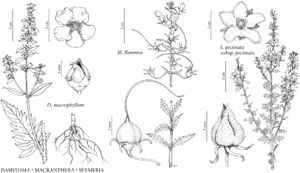Macranthera flammea
Bull. Torrey Bot. Club 40: 124. 1913.
Perennials or biennials monocarpic, blackening upon drying. Stems virgately branched distally, 4-angled, 8–35 dm. Leaves: petiole winged, to 2 cm; blade lanceolate to narrowly ovate, 8–15 x 2–6 cm, smaller distally, surfaces glabrate. Racemes 8–36 cm. Pedicels deflexed-spreading proximally, strongly upcurved distally. Flowers: calyx-tube 2–4 mm, retrorsely puberulent, lobes 7.5–15 mm, longer than tube; corolla 20–25 mm, exterior densely glandular-mealy, lobes 3–4.5 mm, shorter than tube, abaxial lobes reflexed-spreading, adaxial erect; stamens long-exserted, filaments orange, 15–46 mm; style long-exserted, 28–36 mm, glabrous. Capsules brown, ovoid, 9.5–13 mm, densely puberulent. Seeds 2.5–3 mm, wings 2–5.2n = 26.
Phenology: Flowering Aug–Oct.
Habitat: Periodically burned streamheads and ecotones, baygall ecotones, seepage slopes, margins of shrub-tree bogs, cypress-gum depressions.
Elevation: 0–100 m.
Distribution
Ala., Fla., Ga., La., Miss.
Discussion
Macranthera flammea is one of the more striking plants in the flora area due to its remarkable height (for an herb) and numerous, brilliant orange flowers; it is best able to compete with associated shrubs and trees by flowering prolifically following fire and attracting hummingbirds. There is precise coincidence in the flowering of this species and the arrival of ruby-throated hummingbirds (Archilochus colubris) prior to their trans-Gulf migration to Central America (A. L. Pickens 1927).
Selected References
None.
Lower Taxa
"dm" is not declared as a valid unit of measurement for this property.
